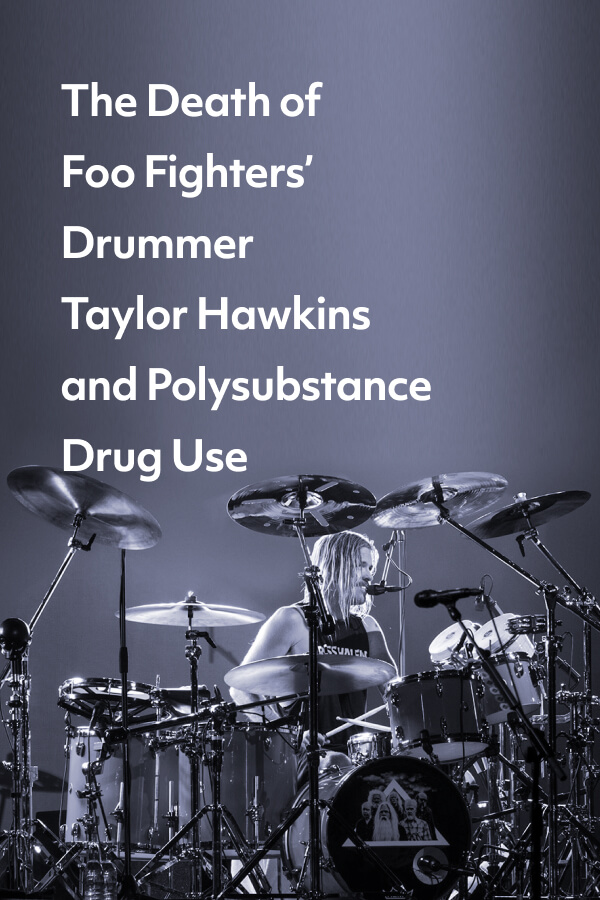Taylor Hawkins, the drummer of the Foo Fighters died in a Bogota hotel room on Friday, March 25th. The cause of death has not yet been announced, but on Saturday, the District Attorney of Columbia released a preliminary toxicology report stating that Hawkins had ten substances in his system, including benzodiazepines and opioids. The police also reported that those close to Hawkins suspect the death may be drug-related.
Many fans and music lovers are grieving
For many millennials like myself, the Foo Fighters was the soundtrack of our adolescence. Hawkins joined the band in 1999 and has played on each album since, including on hit songs like Best of You, Times Like These, and All My Life. Hawkins told Spin in 2002, “A lot of my insecurities—which led to a lot of my drug use—had to do with me not feeling like I was good enough to be in this band.” Despite those insecurities, Hawkins and the Foo Fighters excelled at their craft, winning 12 Grammys and joining the Rock & Roll Hall of Fame. Hawkins is survived by his wife, Alison, and his three children.
The deaths of celebrities always hurt. We may have never met them, but—through TV and in magazines—they’re the people we’ve grown up with. They’ve created work that speaks to something in ourselves we aren’t able to quantify. For those of us in recovery, celebrity deaths that are drug-related can hit especially hard. I remember where I was when I heard Amy Winehouse died in 2011. At two years sober, I was haunted with questions. If someone with all that talent and brilliance can’t make it in this big world without drugs and alcohol, however could I? We’ve lost over a million Americans to drug overdose: not all of them are celebrities, but each death is a staggering loss for family, friends, and our communities.
Hawkins’ passing reveals a larger trend
Whether or not Hawkins’ death is ultimately found to be drug-related, the ten substances in his system are reflective of a larger trend—we’re currently in a fourth wave of the overdose epidemic, where polydrug use and overdose is becoming more common. Although 70% of drug overdoses include opioids, over half of opioid overdoses also include additional drugs, most often stimulants like methamphetamine and cocaine, or depressants like the benzodiazepines found in Hawkins’ system.
Taking either stimulants or depressants in combination with opioids can increase the risk of overdose. Taylor Hawkins didn’t have stimulants in his system, but stimulant and opioid overdose deaths are on the rise. Up to 40% of cocaine overdoses involve opioids, and people who use opioids may turn to stimulants to counteract opioids’ depressant effects. Illegally manufactured fentanyl analogs are increasingly being mixed into non-opioid drugs, increasing the likelihood that someone may not realize they’re taking the incredibly potent fentanyl. Because these two classes of substances affect the brain in opposite ways, taking methamphetamine or cocaine can mask the effects of opioids. The effects of stimulants will wear off more quickly than those of opioids, increasing the risk of respiratory failure or heart rate changes once the stimulants wear off.
Benzodiazepines, one of the medications listed on Taylor Hawkins’ toxicology report, are one of the most widely used medications in the world, prescribed to treat anxiety and insomnia. Benzodiazepines and opioids are both depressants, and combined they can suppress breathing and increase the risk of overdose. 30% of opioid overdose deaths include benzodiazepines, and roughly 20-30% of people taking benzodiazepines in the United States are also receiving a prescription for opioids.
Where do we go from here?
If you’re still struggling with drugs or alcohol, practice harm reduction strategies to take care of yourself: go slow; listen to your body’s need for food, water, and sleep; don’t use alone; test your supply.
If you’re in recovery, and the news of Hawkins’ death has left you shattered, give yourself space to grieve. Many of us form personal attachments with celebrities who resonate with us, and feel like we’ve lost a friend. Do something to take care of yourself, whether that means preparing a healthy meal, taking a walk, or reaching out to a friend you haven’t talked with in a while. And let Hawkins’ memory live on for you through his music. As the Foo Fighters said on Twitter, “His musical spirit and infectious laughter will live on with all of us forever.”









